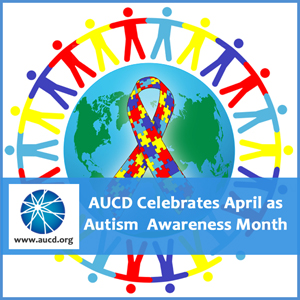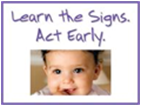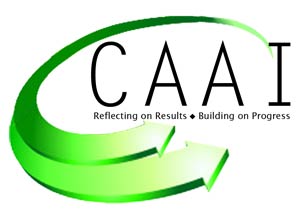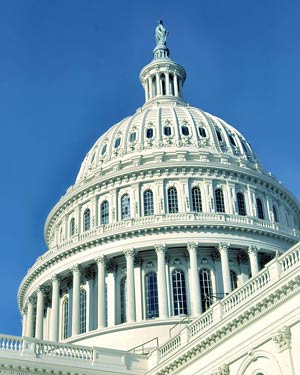AUCD Celebrates April as Autism Awareness Month
April 1, 2014

|
On December 18, 2007, the UN General Assembly designated April 2 as World Autism Awareness Day, which was first observed in 2008. This UN resolution is one of only three official disease-specific United Nations Days that brings world attention to autism spectrum disorder, a developmental disorder that affects as many as 1 in 68 children, according to new estimates from the Centers for Disease Control and Prevention (CDC). The new rate of 1 in 68 reflects a 30% increase from two years ago when the CDC released data that 1 in 88 children has autism.
These new numbers confirm that this developmental disability continues to be on the rise, which is why AUCD strongly supports a swift reauthorization of the Combating Authorization Act (CAA). The CAA targets every federal department, agency, and office that addresses Autism Spectrum Disorder (ASD) research, surveillance, and the development of evidence-based interventions in order to accelerate the pace of scientific discovery and translation to services. The law has helped to expand research and coordination at the National Institutes of Health (NIH), increased public awareness and surveillance at the Centers for Disease Control (CDC), and expanded the interdisciplinary training of health professionals to identify and support children and youth with ASD and their families through programs of the Health Resources and Services Administration (HRSA). The law was reauthorized in 2011 (P.L.112-32) and is scheduled for reauthorization this year. If no action is taken, the activities authorized under the law will expire on September 30, 2014. For more information, visit AUCD's Public Policy Page.
Supporting Autism Awareness
During the month of April, AUCD joins the autism community in supporting increased awareness of the needs of families and individuals affected by autism and the research and training that is underway to address those needs. Although significant progress has been made over the past few years, a great deal more needs to be done in developing appropriate services and supports for children, adolescents and adults on the autism spectrum and their families.
AUCD and our national networks are taking action by providing cutting edge information, news, events and resources. AUCD's network of nonprofit university-based interdisciplinary centers which include 67 UCEDDs, 43 LENDs and 15 IDDRCs, work in every state and territory to advance policy and practice for people living with disabilities and their families. Below, are just a few highlights from AUCD's current autism-related activities in diagnosis, treatment, family support, professional training, research and education.
- Partnerships
- Training Materials and Workshops
- Public Policy
- Sharing Current Autism Related Information
AUCD collaborates with federal and state agencies, university centers, and other nonprofit organizations to promote the health, education and well-being of individuals with autism and other developmental disabilities, their families and their communities. These collaborations help advance policies and practices at the local, state and national level.
 "Learn the Signs. Act Early."
"Learn the Signs. Act Early."
The Centers for Disease Control and Prevention (CDC) National Center on Birth Defects and Developmental Disabilities and the Association of University Centers on Disabilities (AUCD), with support from the Health Resources and Services Administration (HRSA), Maternal and Child Health Bureau (MCHB), are currently reviewing applications for a funding opportunity for Act Early Ambassadors to work with CDC's "Learn the Signs. Act Early." (LTSAE) program to improve early identification of developmental delays and disabilities, including autism. This will be the forth cohort of Act Early Ambassadors who will continue work of serving as a state, territory or organizational point-of-contact for the national LTSAE program and support of the work of Act Early Teams and other state or national initiatives to improve early identification of developmental delay and disability. Ambassadors also work to promote adoption and integration of LTSAE resources, including materials to support developmental monitoring (milestone checklists, Milestone Moments booklet) and professional education tools ("Autism Case Training: A Developmental Behavioral Pediatrics Curriculum", "Autism Case Training: Web-based CE Course") for primary care health professionals. Announcements of this forth cohort of Act Early Ambassadors will be made in early May. Please check out www.aucd.org/actearly for more details.
 SPHARC
SPHARC
AUCD works closely with the Association of Maternal and Child Health Programs' (AMCHP) State Public Health Autism Resource Center (SPHARC). The goal of this center is to develop a strategy for defining, supporting, and monitoring the role of state Public Health agencies in assuring that children and youth with ASD and other developmental disabilities receive early and timely identification, diagnosis, and intervention.
 CAAI Network
CAAI Network
AUCD partners with HRSA to help support three types of grantees funded under the MCHB Combating Autism Act Initiative (CAAI): training grantees including Leadership Education in Neurodevelopmental Disabilities (LEND) programs and Leadership Education in Developmental-Behavioral Pediatrics (DBP) programs; research grantees and state implementation grantees. These programs help achieve the CAAI goal of enabling all infants, children and adolescents who have or are at risk for developing autism spectrum disorder (ASD) and other developmental disabilities (DD) to reach their full potential by: 1) developing a system of services that includes screening children for early possible ASD and other DD; 2) conducting early, interdisciplinary evaluations to confirm or rule out ASD and other DD; and 3) providing evidence-based, early interventions when a diagnosis is confirmed.
TRAINING MATERIALS and WORKSHOPS
 The purpose of the Interdisciplinary Technical Assistance Center (ITAC) on Autism and Developmental Disabilities at AUCD is to improve the health of infants, children, and adolescents who have, or are at risk for developing, ASDs and other developmental disabilities. ITAC provides technical assistance to LENDs and Developmental-Behavioral Pediatrics (DBP) training programs funded by the Maternal and Child Health Bureau to better train professionals to utilize valid and reliable screening tools to diagnose or rule out and provide evidence-based interventions for children with ASD and other developmental disabilities.
The purpose of the Interdisciplinary Technical Assistance Center (ITAC) on Autism and Developmental Disabilities at AUCD is to improve the health of infants, children, and adolescents who have, or are at risk for developing, ASDs and other developmental disabilities. ITAC provides technical assistance to LENDs and Developmental-Behavioral Pediatrics (DBP) training programs funded by the Maternal and Child Health Bureau to better train professionals to utilize valid and reliable screening tools to diagnose or rule out and provide evidence-based interventions for children with ASD and other developmental disabilities.
DSM-5 Resources
Under the new DSM-5 criteria, clinicians will diagnosis individuals with a single umbrella diagnosis of ASD, rather than the four separate disorders that could be diagnosed under the DSM-IV: autistic disorder, Asperger's disorder, childhood disintegrative disorder and pervasive developmental disorder not otherwise specified. This page includes select resources that AUCD network members have found to be helpful in understanding the changes to the new criteria. Questions? contact [email protected].
Workshop: LEND Workshop: Autism Spectrum Disorder and Hearing Loss: On Sunday April 13, 2014, over 50 LEND students and faculty will participate in an interactive workshop using active learning strategies and case-based discussions to review issues and challenges surrounding hearing loss and autism spectrum disorder (ASD). During the workshop, participants will be placed in large and small group settings and will be encouraged to share personal examples while learning best practices used by LEND faculty and staff. The workshop, funded by MCHB and organized by the Association of University Centers on Disabilities (AUCD), is a pre-conference activity held in conjunction with the Early Hearing Detection and Intervention (EHDI) conference in Jacksonville, Florida in partnership with NCHAM. For more information, please contact Meaghan McHugh at AUCD ([email protected])
 |
AUCD member programs include 67 UCEDDs, 43 LENDs, and 15 IDDRCs, and we support the 7 DBP programs as well as the agendas of many other disability and training programs around the nation. AUCD members are located across the United States and its territories and are all part of universities or medical centers. Our networks, individually and together, have participated in the conduct of research, education, and training and technical assistance related to the Combating Autism Act.
AUCD urges Congress to quickly reauthorize the Combating Autism Act before it expires. Continued collaborative efforts between the public and private sectors are essential to drive the innovations that will lead to improved identification, interventions, and services for people with ASD and their families. Without reauthorization of the CAA, HRSA would have to terminate grants for training programs, intervention research, and State demonstration grants. With the increasing prevalence of ASD, we cannot scale back our national effort by letting provisions of the Combating Autism Act sunset.
AUCD stands ready to assist Congress to introduce and pass a bill to reauthorize this important legislation as soon as possible. If you have any questions or need more information, please contact me or AUCD's Director of Public Policy, Kim Musheno ([email protected]).
For more information on Autism, the Combating Autism Act, or other Policy issues supported by AUCD, visit our Public Policy page.
SHARING CURRENT AUTISM RELATED INFORMATION
AUCD and its network of nonprofit university-based interdisciplinary centers work in every state and territory to advance policy and practice for people living with disabilities and their families. AUCD, our national networks and partners regularly collaborate to disseminate cutting edge news, materials and publications, events and resources.
Thursday, April 24, 2014 (3-4pm ET)
Applied Behavior Analysis: Statewide Issues and SolutionsIn this webinar, issues around the implementation of Applied Behavior Analysis (ABA) programs will be discussed including licensure, funding, diversity of practices and quality, understanding of ABA and collaboration between ABA providers and other organizations. Both Tennessee and Indiana have addressed these issues and in different ways. This webinar will highlight the processes both states have followed in trying to reach some consensus and to promote legislation in this area. Contact Rebecca Carman at [email protected] for more information.
Wednesday, April 30, 2014
Autism Spectrum Disorder and Transition (registration available soon)This webinar will begin with a presentation from Got Transition staff who will speak broadly about transition and an upcoming Federal transition plan. This presentation will be follow by CAAI grantee presentations on research, training, state-specific successes and best practices for advancing transition for individuals on the autism spectrum. For more information, contact Rebecca Carman at [email protected]
May 2014 (TBD)
Reducing Disparities for People with Autism Spectrum Disorder (May, TBD)Disparities in accessing diagnostic and treatment services, access to care based on location, and racial and cultural differences in outcomes exist in our health care service systems. This webinar will focus on CAAI grantees work in reducing some of these disparities for individuals on the autism spectrum. Date and presenters are being confirmed and will be announced soon. For more information, contact Rebecca Carman at [email protected]
AUCD ARCHIVED Webinar: Autism Spectrum Disorder and Children Who are Deaf or Hard of Hearing (also found at: www.aucd.org/webinars)
This webinar used a combination of information from the literature, retrospective chart review of children with a dual diagnosis and feedback from family and professional focus groups to assist participants in understanding the unique needs of children who are deaf/hard of hearing (hoh) with an autism spectrum disorder. Red Flags for atypical communication were presented as well as information about the needs related to communication, functional skills, and integrated care models. (Speakers: Susan Wiley, MD and Michael Scott, AuD of the LEND program at the Cincinnati Children's Hospital and Medical Center.)
Upcoming and past webinars on autism spectrum disorders and other topics are housed in the AUCD Webinar Library. All of our archived webinars are free and open to the general public.
Developments Newsletter
Developments is a quarterly newsletter for grantees of the Combating Autism Act Initiative (CAAI). Published by AUCD's Interdisciplinary Technical Assistance Center on Autism and Developmental Disabilities (ITAC) in partnership with AMCHP's State Public Health Autism Resource Center (SPHARC), this newsletter allows grantees and partners to share current news, activities, events, research, and accomplishments in autism and related developmental disabilities with program faculty, students, and supporters. Sections of the newsletter are regularly devoted to each of the grantee groups (research, states, LEND training and DBP training), as well as MCHB and our collaborating partners.
CAAI Infographic
The Combating Autism Act Initiative (CAAI) was created by the Maternal Child Health Bureau in 2008 to promote early screening, diagnostic evaluation, and intervention for children with autism spectrum disorders and other developmental disabilities through training, awareness building, research, and systems development. This infographic shows data highlighting some of the accomplishments from LEND Programs under CAAI since 2008.
- CDC's Autism Resource Center
- CDC's "Learn the Signs. Act Early." program
- CDC's Autism Case Training: A Developmental-Behavioral Pediatrics Curriculum
- HRSA's Maternal and Child Health Training Program
- Combating Autism and Other Developmental Disabilities (HRSA)
- Eunice Kennedy Shiver National Institute of Child Health and Human Development
- Interagency Autism Coordinating Committee
About Autism Spectrum Disorder
Autism is a complex developmental disability that typically appears during the first three years of life and affects a person's ability to communicate and interact with others. Autism is defined by a certain set of behaviors and is a "spectrum disorder" that affects individuals differently and to varying degrees. There is no known single cause for autism, but increased awareness and funding can help families today. For more information about autism and early warning signs, see Centers for Disease Control and Prevention (CDC).









